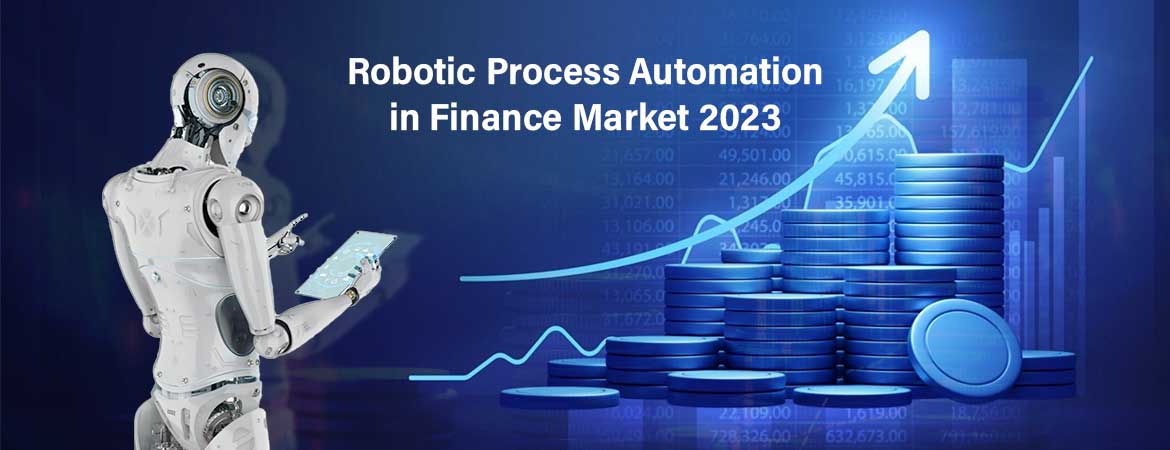
We use cookies to ensure that we give you the best experience on our website.
By using this site, you agree to our use of cookies. Find out more.
This blog post will discuss the current landscape of RPA in finance, market trends, growth forecasts, key benefits, and major players. It will also focus on the future outlook for Robotic Process Automation in the Finance sector.

Robotic Process Automation (RPA) involves the use of digital tools to automate repeatable tasks that would otherwise be done manually by employees. In the finance industry, RPA has transformed the way banks, insurance companies, and other financial institutions operate through the automation of many time-consuming processes.
Specifically, we'll cover robotic technology insights like explaining what RPA is and how it works. It will also discuss the use cases of RPA in finance functions, the market size, and revenue projections. At last, it will also discuss emerging opportunities that RPA opens up for innovating financial services.
Robotic Process Automation, commonly referred to as RPA, uses artificial intelligence and machine learning to automate routine tasks that are traditionally performed by humans. RPA software works by "attending" to user applications and manipulating them in the same way that users do. This includes entering data, reading digital files, uploading information to systems, and other repetitive tasks. However, unlike humans, RPA bots can work 24/7 without mistakes to complete these tasks quickly and accurately.
RPA tools are programmed to identify and interpret various objects on the screen, replicate human actions, and are trained to interpret incorrect outcomes and exceptions. Robotic Process Automation processes run on the existing IT infrastructure and systems without the need for additional investment. This makes RPA an attractive technology for businesses looking to reduce costs and improve efficiency while limiting changes to their existing systems. By automating repetitive tasks, RPA helps employees increase productivity by redeploying their time towards more valuable work.
The current landscape of Robotic Process Automation in the finance sector:

Here are the key market trends and growth forecasts for Robotic Process Automation Finance:
Here are the main benefits of implementing Robotic Process Automation in the finance sector:
RPA automates repetitive, manual tasks previously done by human workers, leading to significant reductions in labor costs. Finance functions like accounting, reporting, and underwriting involve many rule-based tasks that are ideal for automation.
RPA bots can process large volumes of data and transactions faster and more accurately compared to humans. This improves overall efficiency and turnaround times for finance processes.
Robotic Process Automation eliminates human errors and variations, ensuring compliance with regulations, policies, and standards. This is especially important for processes like bank reconciliations, AML checks, and audits.
By automating routine tasks, RPA frees up employees to focus on more strategic and value-adding work that requires human skills. These skills include creativity, complex analysis, and decision-making.
Continuous monitoring and analytics capabilities of RPA reduce operational, compliance, and financial risks. Robotic Process Automation excels at identifying anomalous patterns that indicate fraud or risk issues.
RPA provides an automated audit trail for finance processes, improving visibility, oversight, and governance.
RPA solutions can easily scale up or down based on business demands.
24/7 availability -
Robotic Process Automation bots can work around the clock without breaks, ensuring time-sensitive. It also helps mission-critical tasks in finance functions like accounting run smoothly.
Here are the key players in the Robotic Process Automation in Finance market:
The future outlook for Robotic Process Automation in finance is promising, with key opportunities in:
More financial institutions will adopt platforms that combine RPA, AI, machine learning, and other technologies. This will enable bots to handle more complex processes.
RPA adoption will move beyond operations into different areas. It includes customer experience, fraud detection, risk management, robo-advisory, and regulatory reporting services.
As RPA bots handle more complex tasks and processes, the return on investment from automation will increase for financial organizations.
Automation will allow financial institutions to innovate new business models, products, and services. It will reshape traditional finance work through concepts like the "digital workforce".
While some roles will change, automation will also create new higher-value roles. Workers will need new technical, digital, and soft skills to stay relevant.
Robotic Process Automation vendors will enhance platforms with more capabilities, tools, and best practices. It helps organizations overcome challenges and mature automation.
Automation has the potential to fundamentally transform how work is done in finance.
Robotic Process Automation is bringing about significant changes in the finance sector. RPA helps automate repetitive manual tasks, enabling banks, insurers, and other finance companies. It helps achieve efficiency gains, cost reductions, improved data quality and accuracy, and better risk management. While still in the early phases of adoption, the RPA market for finance organizations is growing rapidly and is expected to continue its strong growth trajectory due to the benefits it provides. As RPA technologies advance with cognitive capabilities, cloud-based solutions, and the ability to handle more complex processes, the ROI potential from automation will increase further.
In the long run, RPA has the potential to fundamentally transform the future of work in finance through new skills, jobs, digital workforces, and innovation. As RPA bots gradually take on more human-like capabilities in collaboration with workers, they will help create a more productive and adaptive financial ecosystem. Therefore, Robotic Process Automation is poised to become an integral part of the operations and digital strategies for most financial institutions in the coming years as its value and impact become clear.
Leave a Comment
Your email address will not be published.